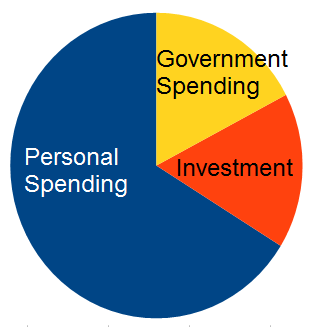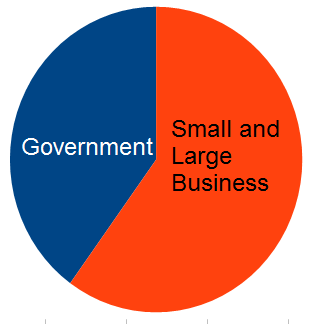A consumer economy describes an economy driven by consumer spending as a percent of its gross domestic product, as opposed to the other major components of GDP (gross private domestic investment, government spending, and imports netted against exports).
Follow up:
Using Gross Domestic Product, the economy looks this way - and is driven by consumers (66% consumer driven).
GDP starts with cash flow data, separates income from expenditures, determines whether the spending meets the definition of included elements in GDP, and then must determine the FINAL spender of the money so the money is placed in the correct pocket.
And the final conclusion is that the USA has a consumer driven economy.
Really? Does the consumer drive the economy? It does if you focus on GDP. If one looks at initial expenditures instead of final, the economy looks like this before, or in parallel to, any income is transferred to the consumer:
The federal government takes money in from business (employees have tax money removed by business and sent directly to government), spends some - then transfers the majority to state governments and individuals in the form of social security et al. The USA federal, state and local governments handle 40% of GDP before transfer payments reduce this number to 17%.
The chart below shows the ratio of government money expenditures to GDP since 1980. [Note that Federal Government transfer payments to state governments, and state transfer payments to local governments, have been removed so government expenditures are counted only once.]
It is interesting what happens to government spending during recessions. Note the dip during the Great Recession despite stimulus. Also note that the government was accelerating spending until 2000. Was the Clinton economic miracle in the 90s due to increased government spending / transfer payments? This is a subject for a later post.
The consumer gets literally all their income either through employment, running its own business, or from the government. Only a consumer running its own business is directly generating initial expenses. Being an employee is an expense for a business - is the real first economic entry coming from selling products / services? Employees and materials are costs to the economy - not the drivers per se. [This argument runs afoul of who is actually BUYING the products - an economy needs buyers and sellers.] The premise here is that sellers MAY be more important than buyers - and the Federal Government and the Federal Reserve in their actions are validating this is true.
Is thinking that the USA is a government/business driven economy any more correct than believing it is a consumer driven economy? Buying and selling is a symbiotic relationship - and convincing ourselves that buying is more important than selling (as the GDP model implies) is factually incorrect.
The consumer may not be so important in the scheme of things as history shows they spend or save all their paycheck. Saving money does not help the economy. Could it be the economy works more efficiently if wages are kept to a level where consumers must spend all of their pay? The Federal Reserve's concentration on business (and lack of sympathy towards the consumer) can be understood if one views the economy as government / business driven. Of course, if pay to consumers is repressed, then savings is reduced and something's got to give in old age. Either government makes sufficient transfer payments or people must work until they die. Or both.
Other Economic News this Week:
The Econintersect Economic Index for September 2016 is showing better growth for the second month in a row - but the rate of growth outlook remains weak. The index remains near the lowest value since the end of the Great Recession. There remain recession warning flags in some of the data we are reviewing..
Bankruptcies this Week: Light Tower Rentals
Click here to view the scorecard table below with active hyperlinks
Weekly Economic Release Scorecard:
- English (UK)
- English (India)
- English (Canada)
- English (Australia)
- English (South Africa)
- English (Philippines)
- English (Nigeria)
- Deutsch
- Español (España)
- Español (México)
- Français
- Italiano
- Nederlands
- Português (Portugal)
- Polski
- Português (Brasil)
- Русский
- Türkçe
- العربية
- Ελληνικά
- Svenska
- Suomi
- עברית
- 日本語
- 한국어
- 简体中文
- 繁體中文
- Bahasa Indonesia
- Bahasa Melayu
- ไทย
- Tiếng Việt
- हिंदी
Are U.S. Governmen and Business The Real Economic Drivers?
Published 09/04/2016, 03:42 AM
Updated 05/14/2017, 06:45 AM
Are U.S. Governmen and Business The Real Economic Drivers?
3rd party Ad. Not an offer or recommendation by Investing.com. See disclosure here or
remove ads
.
Latest comments
Install Our App
Risk Disclosure: Trading in financial instruments and/or cryptocurrencies involves high risks including the risk of losing some, or all, of your investment amount, and may not be suitable for all investors. Prices of cryptocurrencies are extremely volatile and may be affected by external factors such as financial, regulatory or political events. Trading on margin increases the financial risks.
Before deciding to trade in financial instrument or cryptocurrencies you should be fully informed of the risks and costs associated with trading the financial markets, carefully consider your investment objectives, level of experience, and risk appetite, and seek professional advice where needed.
Fusion Media would like to remind you that the data contained in this website is not necessarily real-time nor accurate. The data and prices on the website are not necessarily provided by any market or exchange, but may be provided by market makers, and so prices may not be accurate and may differ from the actual price at any given market, meaning prices are indicative and not appropriate for trading purposes. Fusion Media and any provider of the data contained in this website will not accept liability for any loss or damage as a result of your trading, or your reliance on the information contained within this website.
It is prohibited to use, store, reproduce, display, modify, transmit or distribute the data contained in this website without the explicit prior written permission of Fusion Media and/or the data provider. All intellectual property rights are reserved by the providers and/or the exchange providing the data contained in this website.
Fusion Media may be compensated by the advertisers that appear on the website, based on your interaction with the advertisements or advertisers.
Before deciding to trade in financial instrument or cryptocurrencies you should be fully informed of the risks and costs associated with trading the financial markets, carefully consider your investment objectives, level of experience, and risk appetite, and seek professional advice where needed.
Fusion Media would like to remind you that the data contained in this website is not necessarily real-time nor accurate. The data and prices on the website are not necessarily provided by any market or exchange, but may be provided by market makers, and so prices may not be accurate and may differ from the actual price at any given market, meaning prices are indicative and not appropriate for trading purposes. Fusion Media and any provider of the data contained in this website will not accept liability for any loss or damage as a result of your trading, or your reliance on the information contained within this website.
It is prohibited to use, store, reproduce, display, modify, transmit or distribute the data contained in this website without the explicit prior written permission of Fusion Media and/or the data provider. All intellectual property rights are reserved by the providers and/or the exchange providing the data contained in this website.
Fusion Media may be compensated by the advertisers that appear on the website, based on your interaction with the advertisements or advertisers.
© 2007-2024 - Fusion Media Limited. All Rights Reserved.




